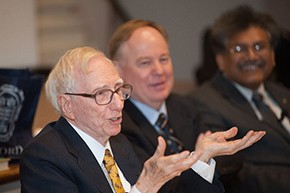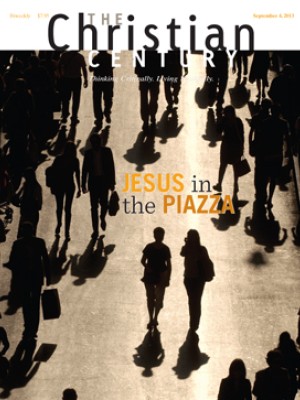The logic of the holy: Robert Bellah, 1927–2013
“Time in its aging course teaches all things,” wrote Aeschylus. No one learned more from it than Robert Bellah. In seeking to make sense of modernity in the classical tradition of sociology as a field, Bellah’s work spanned the social sciences and comparative cultural inquiry. He saw the diversity and coherence of religion as the key to culture across civilizations. Trained as a student of tribal cultures, East Asian civilization and Islam, Bellah engaged the West, and the United States in particular, as problematic cases that can be understood only in the broadest comparative perspective.
In his own life, the Christian existentialism of Paul Tillich in The Courage to Be opened up the possibility of a faith beyond belief in the unbelievable, grounded in the power of the God above the God of theism. Tillich also opened up to him the sacramental substance of the church, embodying the presence of the divine in everything finite.
Read our latest issue or browse back issues.
Only through the sacraments, Bellah came to see, can the church enact the catholic truth that the “holy of being” must precede the “holy of what ought to be.” Without the sacramental body of the church, the revolutionary spirit of prophetic criticism has no roots to sustain itself. It risks reduction to cultural activism and moral utopianism, as Tillich warned. Neglect of the sacraments informs the modern world’s neglect of the natural as sacred, Bellah warned, allowing its exploitation to endanger not only human community but the biosphere that sustains all life.
In the Pauline image of the body of Christ, the church is the living presence of Christ on earth, itself the fundamental sacrament from which all the sacraments are derived, as Karl Rahner put it. Bellah drew these terms into Habits of the Heart to rework Ernst Troeltsch’s typology of church, sect, and mysticism as three ideals of religious community.
The church enters into the world culturally and socially in order to influence and remake it. By contrast, individuals chosen by God come out of the world and join together to create the sect, and these elect stand apart from the world in order to transcend or conquer it. Modern mystics swim through the world, taking it as given, relying on the structure of the very institutions they ignore to channel the stream of the spirit. The church comes before individuals. It takes them where they are, and it nurtures and raises them up.
For a public church to flourish in a denominational society such as ours, Bellah judged, it must encompass the dimensions of church, sect and mysticism and enable the strengths of each type to offset the limitations of the others. Individuality and society depend on each other, as the organic example of the church reminds us.
Bellah’s reflections on “civil religion” began with his recognition of how sacred beliefs, symbols and rituals are institutionalized in a collectivity. As a cultural dimension of depth, civil religion frames modes of moral discourse and imagination to enable coherent cultural conflict in successive times of trial, which give rise to contrasting public theologies that contest the meaning of civil religion and reshape it in turn. Rather than construe civil religion as a unitary moral foundation that was once fixed and then fragmented, Bellah’s later work develops its dialectical logic as an ongoing argument involving multiple moral traditions.
Bellah also saw that an increasingly international kind of social life was gradually developing through the global expansion of the division of labor in the world’s economy and its political-legal regulation. If a genuinely transnational sovereignty emerged with the attainment of some kind of coherent world order, Bellah concluded, it would precipitate new forms of civil religion, whether they were to grow from the flickering flame of the United Nations or from the light spread by thousands of NGOs, such as those working on human rights and the environment.
“Can We Imagine a Global Civil Religion?” asked Bellah in a 2010 paper that defined the direction of his inquiry into the modern project in the light of evolution. He answered the question by distinguishing between the impossibility of a global civil religion and the necessity of strengthening global civil society to create a world order coherent enough to engage the grave problems of global warming, military and political strife, and economic inequality. Any actual civil society will have a religious dimension, Bellah observed—not only a legal and ethical framework, but some notion that the framework fits the nature of ultimate reality.
In fact, religion-like values carried by an emerging global market culture may worsen international problems and place greater weight on the nascent forms of world governance that are evident in international law and economic regulation. Global market ideologies and practices threaten the capacity of nations to carry out the responsibilities inherent in their ideals of common membership, Bellah argued, including their responsibility to sustain their least advantaged citizens through fair wages, taxes and public provision.
The religious roots of a global ethics of human rights led Bellah to ask if the world’s religions can mobilize their deepest commitments to universal neighbor-love and mutual recognition to give genuine institutional force to human rights. Can they help turn ideals of world citizenship into a practical willingness to share responsibility for the world; instead of trying to transform the world into the image of one’s own nation?
Religious motivation is needed to turn the beginnings of world law and the growth of global ethics into effective forms of global solidarity and governance. Religious insight is needed for us to recognize the primacy of the world instead of trying to force the world to recognize our primacy as a nation.
At the time he was working on what became his book Religion in Human Evolution, Bellah preached a sermon for All Souls' Day that returned to his sense of the sacramental body of the church at one with its prophetic spirit. The dead are still part of our living community, he began. They are not dead, and we cannot live without them. We remember our own family and friends, those close to us whom we have lost. But beyond them stretch the vast body of those unknown, and the whole of creation that came before us, and that we owe so much.
“The atoms and molecules that make up our body go back to the earliest moments of the universe,” Bellah observed, and our living tissue goes back to the first single-celled living creatures that emerged billions of years ago. We owe to the whole human species the “musilanguage” that enables us to harmonize. We evolved over a million years through keeping together in time, then came to speak and pray in sentences over the past hundred thousand years or so. We learn to read and write the word of God as revealed and reasoned about since the axial age.
We remember the dead with thanksgiving for all they have given us, Bellah said. We remember the enormous suffering and injustice borne by those who have come before us, known and unknown. We accept our enduring responsibility to take part in their redemption by carrying on their work to bring about the justice and human flourishing they sought, in the midst of the groaning of all creation and the persistence of purgatory on earth. In this prophetic task, Bellah concluded, “we must learn not to be afraid of death, even our own, for death is part of life, and living or dead, we are part of one living community.”
“It is in the Eucharist,” he went on, “that it all comes together: with all the company of heaven, the communion of the saints, and of all souls, all enfolded in one time. Time out of time, all equally present—past, present, and to come. Nunc stans, the eternal now.”






